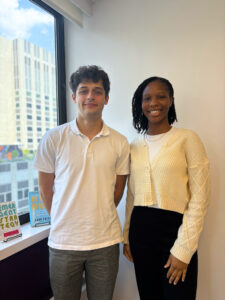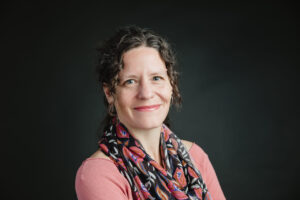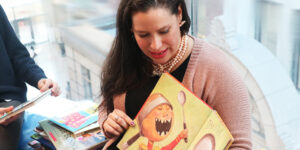What is one of your earliest memories of the power of human connection?
I was supposed to be a doctor. In high school, I had an internship with the University of Miami organ procurement team, the people who work with families when someone dies in a tragedy to donate organs.
As part of that, I observed the doctors meeting with families to get permission. This is a tragic moment, and the families are deeply in grief. In one particular case, I distinctly remember I was about 15 to 16 years old, and I was watching the doctors work with a family whose child had died in a tragedy. The family was just in a fog. They couldn’t process what they were being asked to do, which was to give permission to donate the organs, so everything kind of came to a standstill.
Then the chaplain in the room said to the family, “Let’s just pause for a minute and pray. And maybe you guys can ask your son what he would want you to do.” We just all sat – including me – in silence at that moment. You could just feel an electricity in the room between the people. There’s no way to describe this feeling other than the word love.
It was the first time I saw the power of what can happen with a group of strangers when we set our minds to connecting and elevating our thoughts. Then, the parents opened their eyes. They looked at each other and said, “We would love to do this.”
What values guide your personal life and your work?
This is a little bit theological, I would say. My personal life values are guided by the idea that there is truth — with a capital T — out there in the universe. And with that same idea comes the idea articulated at the end of the Torah, which is that never again did there arise in Israel a prophet like Moses who spoke to God face to face.
What that says to me is that none of us have access to the truth. Only God has the truth. My deepest core value is a certain humility around the truth that there is a perfect, absolute form of goodness and justice, and none of us know exactly what it is. So, we all must be somewhat humble in our pursuit of justice, goodness, and righteousness.
Self-righteousness is really dangerous, and anyone who thinks they have the answers is probably a false prophet. Truth and humility are my core values and how I approach conversation, relationships, and interaction with people.
When did a person or experience change your mind about an idea or belief?
It’s hard to pinpoint one moment; this happens all the time.
When I sit down with people over the Torah or over a sacred text, I approach that with some knowledge, right? I’ve been doing this for a long time. And every time I think I have an inkling of what the text says, I ask somebody else what they think, and they see something different. When this happens, together, we kind of grope in the darkness to try and get closer to understanding what the text is trying to say.
That becomes this mind-opening, imaginative, creative moment where we’re together, trying to figure this out and make sense of things. I often do that with 12-year-olds before their Bar Mitzvah, which is really interesting. I also often do it on Shabbat morning with congregation members.
I think the words on the page are just the human way of trying to express our thoughts and the human way of trying to express what’s inside of us and then connect that with other people. That’s what language is. It’s our desire to reach out to other humans and express something.
The group is a beautiful space where we all accept humility. No one in the room is Moses, so we’re all in the dark to some degree. Those interactions regularly change my mind.
What are you working on right now?
We just finished the Jewish High Holy Days. This week, I’m redirecting my attention back to trying to engage more synagogues in the American Scripture Project as a program in their congregation. We’re hoping to have more rabbis, cantors, and synagogue leaders know how to use these tools to examine American sacred texts, by which I mean the Declaration of Independence and these texts that have become the Scripture for America.
We want to look at the texts as part of the leadership of being a faith leader in America and to bring those things into congregational life, so we can all participate in conversations around what it means to be American with compassion for each other and our differences and the ability to listen and have humility.
The next step is working with the Muslim community in the coming months to figure out the ways Jews and Muslims can talk about Israel and Palestine, potentially using those same types of tools. But instead of using American texts, we would talk about Palestinian and Israeli texts that tell the story of this conflict that we’re in right now and enable people to connect as human beings in a very painful time.
Further down the road, we’re already discussing ways in which America’s Scripture Project can be helpful. God forbid there’s any kind of unrest following the election and any kind of violence. Unfortunately, we’re already seeing political violence in our election season. Hopefully, that won’t happen anymore, but in case it does, we’re hoping that communities can heal by looking at the ways in which people have talked about tragedies and violence in the past in America.
What is giving you hope or what positive visions do you have for our future?
What gives me hope all the time is that I think people want to be loved, and I think that’s universal.
Everything else that we read, see, and hear about, no matter how angry and ugly it gets, the universal desire to be loved is there. We just have to create spaces where people can experience that. Given that we’re in a season right now of division, grief, resentment, despair, and cynicism, piercing all of that and getting to the love is the work.
What also gives me hope is there are approximately 350,000 houses of worship in America, and that’s a really big number. It’s two and a half times the number of schools. It’s a lot more than the number of Starbucks stores. So, I hope that people like me who are clergy with congregations, with the skills to read sacred text, and know how to hold space for love – like the chaplain at the hospital – can tap into that to create more civic health between people and get through some of the conflict entrepreneurism that’s been so prevalent in recent years.





